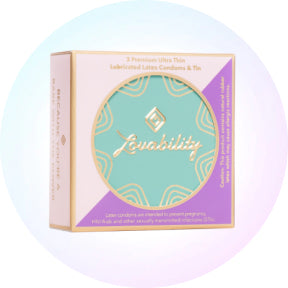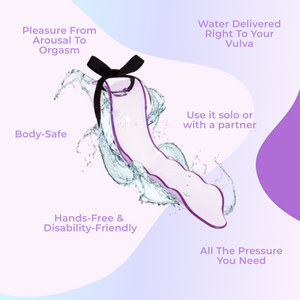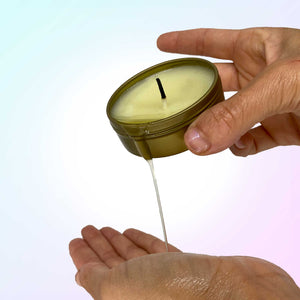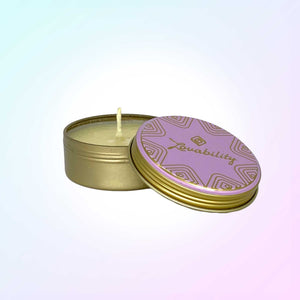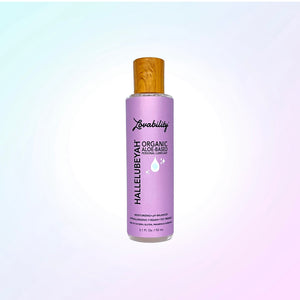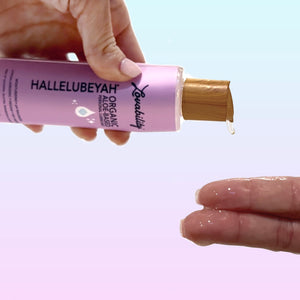Ever checked out the ingredients list on a condom box and felt like you needed a chemistry degree to understand it? We get it. Your intimate health matters, and that's why using natural condoms is a game-changer -- for you and your partner.
Here's why:
-
Chemical-Free Confidence: Your (or your partner's) vagina deserves better than a chemistry lab experiment. Natural condoms skip the unnecessary chemicals found in traditional brands, reducing the risk of irritation and preserving the body's delicate balance.
-
Gentle Ingredients: No more mysterious additives. Lovability's natural condoms are made with four simple, pronounceable ingredients: 100% natural rubber latex, cornstarch powder, pure silicone oil, and a vegetable binder extract. Because why complicate things?
-
No Nasty Surprises: As important as what's included in the ingredients is what's NOT. Ever had a yeast infection after using a condom? Blame glycerin. Our condoms are free from this sneaky ingredient, reducing the risk of yeast infections and keeping your intimate moments worry-free.
-
Vegan & Cruelty-Free: Ethical living extends to your bedroom too. Our natural condoms are vegan and cruelty-free, so you can feel good about your choices inside and out.
-
Sustainability Matters: Lovability is committed to sustainability at every step. Our condoms are made from responsibly sourced latex, with reduced waste and energy use. Plus, our outer boxes are made from recycled cardboard. Because protecting the planet is sexy.
Chemicals To Avoid In Condoms
Let's get a little more specific on what we mean when say Lovability condoms are free from toxic chemicals.
1. Nitrosamines
Nitrosamines are organic compounds from chemical reactions that can form in drugs during manufacturing. The FDA has determined that some nitrosamines increase the risk of cancer in people exposed to them above acceptable levels and over long periods of time.
The use of Nitrosamines attracted the attention of the World Health Organization a few years back which then asked condom manufacturers to regulate their manufacturing process to minimize, if not eliminate, the compound.
While the mandate and annual testing has led to the significant lowering of nitrosamines in most condoms, it is nearly impossible to completely remove nitrosamine precursors from the final condom product. Accordingly, the goal set by WHO is to lower the amount so much that it qualifies as "nondetectable" - the term we use to acknowledge the reality of their insignificant presence due to the hard work our top-rated manufacturer in Malaysia.
2. Glycerin
Glycerin is a common ingredient in personal lubricants, including the lubrication added to condoms. When left in the vagina for an extended period, glycerin can transform into sugar and can lead to yeast infections (or thrush). That doesn't mean everyone who uses a glycerin-containing lubricant is going to get a yeast infection; but if you're prone to yeast infections, glycerin is an ingredient to avoid.
3. Spermicides
Spermicides are designed to kill sperm before they reach their target. Unfortunately, the most common spermicide, Nonoxynol-9, damages healthy cells along the vaginal wall making you (or your partner) both more susceptible to an STI in the future and more likely to get a UTI after use. Double-bonus!
4. Benzocaine
Benzocaine is a numbing agent that is sometimes added to condoms to decrease sensitivity and help men last longer. Nice idea except that Benzocaine is an endocrine disruptor, which means it throws off the hormone messaging system that regulates bodily functions, including your sex drive. It gets better: the more you are exposed to Benzocain, the greater the negative impact.
5. Casein
If you’re vegan or live a cruelty-free lifestyle, then you're looking for everyday food and other products that align with your values. Yet most condoms are not vegan; they contain casein, a protein derived from milk, that can be used to soften and smooth latex during manufacturing.
6. Flavorings & Colorants
Condoms with flavors are specifically intended for use during oral sex only. When used properly, the condom helps to avoid the transmission of an STI, while the added flavoring to the lubricant - think chocolate, strawberry, pineapple - masks the taste of latex. If you use a flavored condom for vaginal sex, however, these additives - usually glucose or glycerin - can cause irritation and a yeast infection, and in some cases an allergic reaction.
Colored condoms are generally considered safe to use so long as they have not be sold as a novelty product. While there are many considerations to finding the right condom, at a minimum, make sure the packaging says they are approved to protect against pregnancy and STIs.
__________________________
Ready to make the switch? Choose Lovability's natural condoms for a safer, more sustainable, and sexier experience. Your body—and the planet—will thank you.
Xo
More Articles You Might Love

Get To Know Your Vulva



